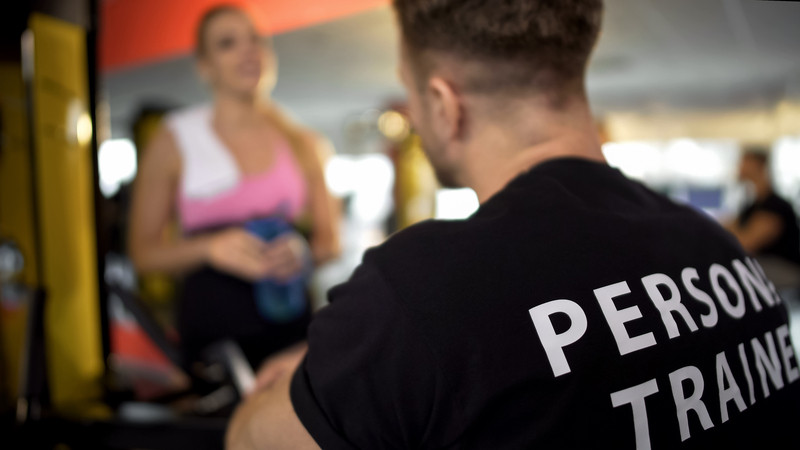Strength And Conditioning
Welcome and thanks for visiting...

How Do Fitness Coaches Differ From Personal Trainers?

If you want to take your fitness to new heights, you may have considered hiring a pro. However, should you choose a fitness coach or a personal trainer?
It all depends on your goals and knowledge of yourself. While fitness coaches and personal trainers share many aspects, the roles have decided differences. Here’s how to determine which style of guidance will best benefit you and your goals.
How Fitness Coaches and Personal Trainers Are Similar
Fitness coaches and personal trainers both provide one-on-one and small group sessions to help their clients reach their wellness goals. Their typical workdays may include activities such as guiding clients through unfamiliar exercises, observing their range of motion, diagnosing areas of strength and improvement, and recommending adjustments to enhance results or improve safety.
There may also be considerable overlap in how they conduct business. For example, fitness coaches and personal trainers may work as employees for a specific organization, as independent contractors for several entities, or form an official business entity such as an LLC or S-corp. You might find one or both in your local gym, and either one may spend time at your workplace’s corporate headquarters as part of an employee wellness program.
5 Differences Between Fitness Coaches and Personal Trainers
However, there are several key differences between fitness coaches and personal trainers. The primary one is their area of concentration. Although there is some overlap, in general, a fitness coach generally takes a more holistic approach. They provide exercise guidance but also instruction on how to fit movement into your lifestyle and become healthier overall.
Personal trainers may sometimes dive into the lifestyle realm. For example, they may suggest dietary changes that could affect your performance, albeit not provide the detailed advice of a licensed nutritionist. However, they devote the majority of your session time to practical work in the gym, coaching you through various moves, helping you improve your form and striving toward your specific goals while increasing accountability.
Here are four other notable differences between fitness coaches and personal trainers.
1. Location, Location, Location
Some personal trainers provide one-on-one support in their client’s homes, but you’ll most often find them in the gym. In fact, hiring a personal trainer might be your best bet if you are new to a specialty location, such as a boxing gym, which can seem a bit unwelcoming at first for those new to the culture. Working with a professional “legitimizes” you — other members will see you’re there to work, not play around, and respect you accordingly.

Another place you’ll often find personal trainers is around collegiate and professional sports teams. Although many focus on folks with varying abilities, some concentrate on specific needs, like building power and muscle size among linebackers.
Fitness coaches also work in gyms sometimes but are much more likely to meet their clients where they typically exercise. It might be a private home or a local park. While such individuals may also work with specific populations, they generally do so in group settings. For example, a fitness coach might host regular sessions at a nursing home to help seniors get their recommended daily movement in a safe, communal environment.
2. Lifestyle or Performance
While fitness coaches take a more general approach to helping anyone live a healthier lifestyle, personal trainers often gravitate toward particular areas of expertise. For example, they might specialize in increasing muscle mass, losing weight while preserving muscle size or building endurance.
Conversely, fitness coaches may seemingly take a “big umbrella” approach to exercise, but that’s because one of their primary goals is helping you make health an integral part of your lifestyle. They might recommend biking to work to get your cardio when you have a packed schedule, whereas a trainer might pause to consider how doing so would affect leg day the next day.
3. Addressing Specific Needs
Personal trainers and fitness coaches both address specific needs, but their area of focus differs. Trainers concentrate more on movement and how it builds or detracts from desired physiological qualities.
The specific needs a fitness coach might help with might include innovative ways to get more outdoor exercise in an urban setting with limited green space. It could involve how to work out with two young kids, maybe even getting them in on the fun.
4. Overcoming Exercise Objections and Roadblocks
Trainers make excellent gym accountability partners. If you know it will disappoint them and cost you money, you're more likely to attend if you fail to show up for a session.
Conversely, a fitness coach might inquire deeper about what made you skip a session. Was it a one-off where work got away from you or a larger lifestyle pattern you must address to facilitate better overall health? For example, they might empower you with methods for staying fit on the road if frequent business travel keeps you out of your home gym.

Tips for Finding the Right Guide for You
The above descriptions should give you a better idea as to whether a fitness coach or a personal trainer is right for your specific needs. Once you narrow down your search, you still must find the perfect personality fit. That means putting on your interview hat.
Your first order of business is to ensure the individual has the knowledge to assist you. Fitness coaches and personal trainers must undergo certification through an accredited organization such as the American Council on Exercise or the American Fitness Professionals and Associates. Unfortunately, many unscrupulous individuals attempt to pass themselves off as trainers without these requirements, so you must ask.
Additionally, the questions below can help you find the right fitness professional with less fuss:
- What drew you to the industry? Some might express a deep love of a particular sport or a general passion for fitness and helping people reach their goals.
- What is your special area of interest or expertise? Some may focus on helping those with disabilities, others may concentrate on sports training, and still more might enjoy assisting harried people to find time to squeeze fitness into their lives.
- What would your other clients say about you? This question can tell you a lot. For example, you’re nearly guaranteed to get a killer workout from a trainer who quips, “Oh, they call me the torturer,” — but that might not be what you want if your goal is to ease stress.
You can also utilize online resources to guide you in your search. For example, SportsEdTV brings athletes and coaches together, creating a supportive community and global directory of places to train. They have collaborated with professionals in various sports to provide education and help you find the guidance you need to advance your fitness.
Distinguishing Fitness Coaches and Personal Trainers
Fitness coaches and personal trainers are passionate about helping people reach their wellness goals. However, they differ slightly in their approach. While trainers focus more on the nitty-gritty of exercise, coaches help you address lifestyle factors that support or hinder your health goals. The right one for you depends on your needs and objectives, but understanding the difference can assist in your search.








